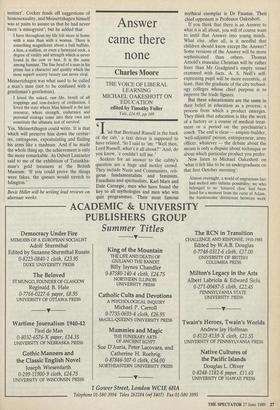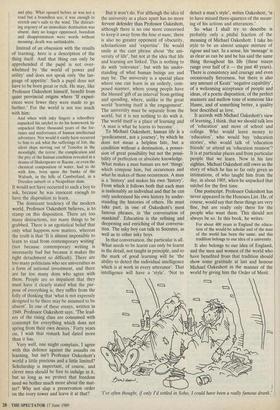Answer came there none
Charles Moore
THE VOICE OF LIBERAL LEARNING MICHAEL OAKESHOTT ON EDUCATION edited by Timothy Fuller
Yale, £14.95, pp.169
I'ad that Bertrand Russell in the back of the cab,' a taxi driver is supposed to have related, `So I said to 'im: "Well then, Lord Russell, what's it all about?" And, do you know, 'e couldn't tell me.'
Seekers for an answer to the cabby's question are a huge and motley crowd. They include Nazis and Communists, reli- gious fundamentalists and feminists, Freudians and spiritualists, Karl Marx and Dale Carnegie, men who have found the key to all mythologies and men who win quiz programmes. Their most famous mythical exemplar is Dr Faustus. Their chief opponent is Professor Oakeshott.
If you think that there is an Answer to what it is all about, you will of course want to instil that Answer into young minds. What else, after all, is it needful that children should know except the Answer? Some versions of the Answer will be more sophisticated than others. Thomas Arnold's muscular Christian will be rather freer than Mr Gradgrind's empty vessel crammed with facts. A. S. Neill's self- expressing pupil will be more eccentric, at least, than the graduate of the city technol- ogy colleges whose chief purpose is to improve the trade figures.
But these educationists are the same in their belief in education as a process, a process from which a product emerges. They think that education is like the work of a factory or a course of medical treat- ment or a period on the psychiatrist's couch. The end is clear — empire-builder, 'well-adjusted' person, entrepreneur, army officer, whatever — the debate about the means is only a dispute about technique or about which particular product you prefer.
Now listen to Michael Oakeshott on 'what it felt like to be an undergraduate on that first October morning':
Almost overnight, a world of ungracious fact had melted into infinite possibility; we who belonged to no 'leisured class' had been freed for a moment from the curse of Adam, the burdensome distinction between work and play. What opened before us was not a road but a boundless sea; it was enough to stretch one's sails to the wind. The distract- ing urgency of an immediate destination was absent, duty no longer oppressed, boredom and disappointment were words without meaning; death was unthinkable.
Instead of an obsession with the results of learning, here is a description of the thing itself. And that thing can only be apprehended if the pupil is not over- whelmed by 'the world of power and utility' and does not speak only 'the lan- guage of appetite'. Such a pupil does not have to be born great or rich. He may, like Professor Oakeshott himself, benefit from quiet provincial origins where 'If experi- ences were fewer they were made to go further.' For the world is not too much with him:
And when with inky fingers a schoolboy unpacked his satchel to do his homework he unpacked three thousand years of the for- tunes and misfortunes of human intellectual adventure. Nor would it easily have occurred to him to ask what the sufferings of Job, the silent ships moving out of Tenedos in the moonlight, the terror, the complication and the pity of the human condition revealed in a drama of Shakespeare or Racine, or even the chemical composition of water, had to do with him, born upon the banks of the Wabash, in the hills of Cumberland, in a Dresden suburb or a Neapolitan slum.
It would not have occurred to such a boy to ask, because he was innocent enough to have the disposition to learn.
The dominant tendency of the modern world, Professor Oakeshott believes, is to stamp on this disposition. There are too many distractions, too many things to be grabbed. There is an egotistical belief that only what happens now matters, whereas the truth is that 'It is almost impossible to learn to read from contemporary writing' (not because contemporary writing is necessarily bad but because it makes the right detachment so difficult). There are too many politicians who see universities as a form of national investment, and there are far too many dons who agree with them. People are so impatient that they must have it clearly stated what the pur- pose of everything is; they suffer from the folly of thinking that 'what is not expressly designed to be there may be assumed to be absent'. In one of these essays, written in 1949, Professor Oakeshott says, 'The lead- ers of the rising class are consumed with contempt for everything which does not spring from their own desires.' Forty years on, I wish that remark had dated more than it has.
Very well, one might complain, I agree with this defence against the assaults on learning, but isn't Professor Oakeshott's world a little precious and a little limited? Scholarship is important, of course, and clever men should be free to indulge in it, but so long as we protect that freedom need we bother much more about the mat- ter? Why not slap a preservation order on the ivory tower and leave it at that?
But it won't do. For although the idea of the university as a place apart has no more fervent defender than Professor Oakeshott, although there is no one more concerned to keep it away from the hinc et nunc, there is also no greater opponent of obscurity, scholasticism and 'expertise'. He would smile at the cant phrase about 'the uni- versity of life', but not at the idea that life and learning are linked. This is nothing to do with 'relevance', but with his under- standing of what human beings are and may be. The university is a special place where one can learn in an orderly, com- posed manner, where young people have the blessed 'gift of an interval' from getting and spending, where, unlike in the great world 'learning itself is the engagement'. The university must be separate from the world, but it is not nothing to do with it. The world itself is a place of learning and 'A man is what he learns to become'.
To Michael Oakeshott, human life is a 'predicament, not a journey', by which he does not mean a helpless fate, but a condition without a destination, a posses- sion of great possibility but not the possi- bility of perfection or absolute knowledge. What makes a man human are not 'things' which compose him, but occurences and what he makes of those occurences. A man is a 'history' and makes his own 'history'. From which it follows both that each man is inalienably an individual and that he can only understand his own history by under- standing the histories of others. He must take part, in one of Oakeshott's most famous phrases, in 'the conversation of mankind'. Education is the refining and deepening and enriching of that conversa- tion. The inky boy can talk to Socrates, as well as to other inky boys.
In that conversation, the particular is all. What needs to be learnt can only be learnt in the detail, not taught in principle, and so the mark of good learning will be 'the ability to detect the individual intelligence which is at work in every utterance'. That intelligence will have a 'style'. 'Not to detect a man's style', writes Oakeshott, 'is to have missed three-quarters of the mean- ing of his actions and utterances.'
So what I shall try to describe is probably only a pitiful fraction of the meaning of Michael Oakeshott. I take his style to be an almost unique mixture of rigour and tact. In a sense, his 'message' is as clear as can be and he has said the same thing throughout his life (these essays range over half of it — the past 40 years). There is consistency and courage and even occasionally fierceness, but there is also any amount of Keats' negative capability', of a welcoming acceptance of people and ideas, of a poetic disposition, of the perfect manners and mellow tone of someone like Hume, and of something better, a quality best described as love.
It accords with Michael Oakeshott's view of learning, I think, that we should talk less of 'education' and more of school and college. Who would leave money to 'education', who would buy 'education stories', who would talk of 'education friends' or attend an 'education reunion'? It is at particular places and from particular people that we learn. Now in his late eighties, Michael Oakeshott still owes us the story of which he has so far only given us intimations, of who taught him from the day, in about 1905, when he unpacked that satchel for the first time.
One postscript. Professor Oakeshott has never appeared in the Honours List. He, of course, would say that these things are very fine, but are really only there for the people who want them. This should not always be so. In this book, he writes:
For about 400 years in England the educa- tion of the would-be scholar and of the man of the world has been the same, and this tradition belongs to our idea of a university. It also belongs to our idea of England, and the men and women of the world who have benefited from that tradition should show some gratitude at last and honour Michael Oakeshott in the manner of the world by giving him the Order of Merit.
'I've often thought, if only I'd settled in Soho, I could have been a really famous drunk.'



















































 Previous page
Previous page